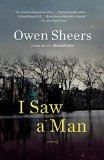Summary | Excerpt | Reviews | Beyond the Book | Readalikes | Genres & Themes | Author Bio

Critics' Opinion:
Readers' Opinion:
First Published:
Jun 2015, 272 pages
Paperback:
Jul 2016, 272 pages
 Book Reviewed by:
Book Reviewed by:
Darcie R.J. Abbene
Buy This Book
Michael had been convinced that New York would unlock the novel he'd failed to write in London. The Hudson gleaming magnesium of a morning; the taillight rivers on Lexington and Third; the city's scale, at once intimate and grand. Manhattan already felt like a novel to him, as if all he'd have to do was take dictation from its streets. But he'd been wrong, which is why halfway through his second year of living in the city, in the wake of his failure with fiction, Michael started splicing the taste of it into his journalism instead.
He began on his own doorstep, telling the story of Ali, the Armenian deli owner on the corner of his block, from his early-morning washing of the sidewalk to his midnight serving of condoms and chewing gum to coked-up SoHo models. When this piece was taken by The Atlantic, the editor asked him for another. So Michael moved his attention across the street to Marilia, the black mother of six who'd volunteered at the school crossing every morning and evening for the last twenty years. Through Marilia he'd gained an introduction into the school itself, where he'd found his next subject in its harrowed headmaster, shadowing him as he juggled the timetable, staff shortages, gun detection, and the demands of downtown parents.
In researching these early stories, Michael found his Englishness opened doors for him. Not in institutions, but in people. There was, in all his subjects, an assumption of his integrity, drawn, he supposed, from associations with the BBC and films by Merchant Ivory. Combined with his natural manner—a calm patience laced with pressing curiosity—this cultural assumption allowed Michael to get close quickly. The people he interviewed trusted him, and in return he took their trust seriously, listening, recording, and taking notes as they talked; trying, as best as he could, to see the city through their eyes and feel it through their skin.
With every story he took on, from the Central Park millionaire to the street-sleeper in the Bronx, Michael's technique was immersive. His initial approach was time: the willingness to spend it, to be there and observe at even the most mundane of events until, despite his height and his accent, people began to forget his presence. He took to cutting hundreds of strips of white card, slender enough to fit into the inside pocket of his jacket. These, he found, were less obtrusive than a notebook and somehow less threatening, too, as if what he wrote on them wasn't being recorded but merely jotted down and would, like any other scrap of paper, not be around for long.
When, after months of such research, Michael felt he'd seen and heard enough—and it was always a feeling more than a knowing, a sense at the edges of his vision—he would leave his subjects' lives as suddenly as he'd entered them. Taking their stories to his desk in his SoHo apartment, he'd immerse himself again, this time borrowing a novelistic style to disappear himself not just from his subjects' lives, but also from the paragraphs he wrote about them. Even though he'd been there at their sides when the events he described happened—when the health inspector had seen a rat, when a kid attacked his maths teacher, when the millionaire's dog was put down—in the finished published piece, Michael was never there. Just the characters remained, living their lives in third person through the hours of the city as if through the pages of a novel.
His style became the antithesis of Gonzo journalism, an eradication of the writer in the writing. A disappearing act of saturation that was informed by the immersive nature of his research, but unfettered, too, by direct experience. So although he hadn't been with them, Michael still described Ali waking in bed, Marilia singing in the shower, or the way the millionaire picked up his coffee at a morning meeting in Brazil. Such moments, although unseen by Michael, were written from what he'd learnt about his subjects at other times, in other places, upon not just what he knew was true, but also what he knew to be true. And this is what he'd hoped to achieve in those early New York stories: to find a way of using the freedoms of descriptive fiction to make the real lives he wrote about even more real.
Excerpted from I Saw a Man by Owen Sheers. Copyright © 2015 by Owen Sheers. Excerpted by permission of Nan A. Talese. All rights reserved. No part of this excerpt may be reproduced or reprinted without permission in writing from the publisher.





The House on Biscayne Bay
by Chanel Cleeton
As death stalks a gothic mansion in Miami, the lives of two women intertwine as the past and present collide.

The Flower Sisters
by Michelle Collins Anderson
From the new Fannie Flagg of the Ozarks, a richly-woven story of family, forgiveness, and reinvention.

The Funeral Cryer by Wenyan Lu
Debut novelist Wenyan Lu brings us this witty yet profound story about one woman's midlife reawakening in contemporary rural China.
Your guide toexceptional books
BookBrowse seeks out and recommends the best in contemporary fiction and nonfiction—books that not only engage and entertain but also deepen our understanding of ourselves and the world around us.